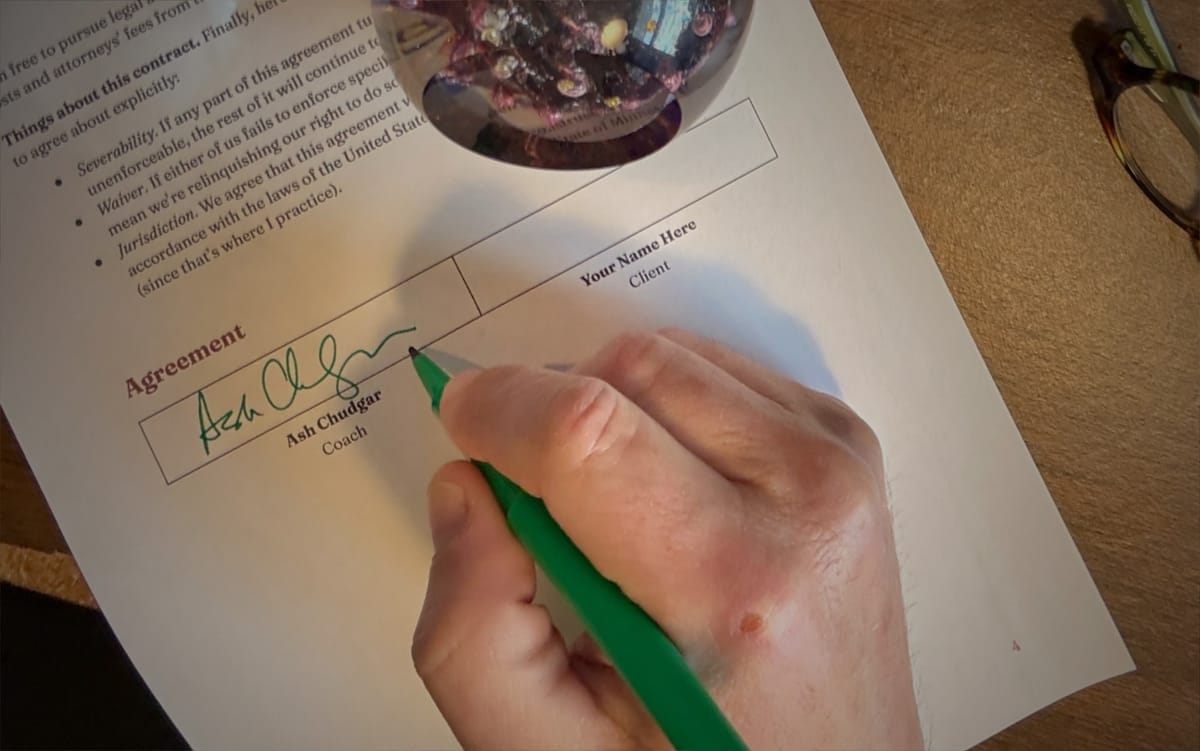Coaching contract
If you choose coaching with me, you’ll sign an agreement just like this one. Give it a thorough read, please, and don’t hesitate to ask if you have any questions at all about any of it.

Why we need a contract
Coaching is a partnership, and this agreement sets out how the two of us want our partnership to work. It’s a legal contract, for sure — but more importantly, it’s a way for the two of us to build our partnership on the basis of shared understanding.
Last revised October 2024 to clarify the difference between coaching and healthcare, update barter language, and address how we might relate outside of our coaching relationship.
Who I am
I’m Neil Ashvin Chudgar, Ph.D., but you can call me Ash (he/him or they/them, whichever you prefer). I’m the coach in this partnership. My coaching approach builds on
- a doctorate in literature,
- ten years of experience teaching college and graduate students,
- ten years of experience as a communications consultant and facilitator, and
- Level 1 training, ongoing consultation, and continuing education in the Internal Family Systems model and other forms of partswork.
What coaching can and can’t do for you
As an inner communication coach, my practice has clear (and liberating) limits:
- I do not diagnose, treat, or claim to cure any illness of body or mind. As a coach, I operate completely outside the pathology-based biomedical model of healthcare.
- I do not guarantee any specific results from coaching. Based on my own experience and that of my clients, I have boundless confidence in this particular mode of coaching — and I am equally sure that the consequences of our work depend entirely on your circumstances, choices, and actions.
As your coach, here’s what I promise:
- I will use all my knowledge, training, and experience to help you live in greater safety, comfort, and harmony with every part of who you are.
- I will listen to you with deep and focused attention.
- I will reflect what I hear back to you with compassion and clarity.
- I will help you interact more skillfully with all the parts of your internal world you choose to share with me.
- I will treat every part of you with respect, always.
- I will offer my honest opinion about other kinds of support you may need, including mental health treatment.
Relationships other than coaching
Like many expert service providers, I sometimes work with clients I know in other contexts: friends, family members, and colleagues. Occasionally, a coaching relationship will lead to other forms of acquaintanceship or collaboration between me and a client — particularly if we are bartering professional services. These relationships take some special care.
- If you and I have a pre-existing relationship, I will clearly explain the boundaries between that relationship and coaching. I’ll explicitly discuss with you how coaching might change our non-coaching relationship before we start, and I’ll continually provide opportunities for us to reflect on how things are going.
- If you and I should decide to remain acquainted in another way, during or after our coaching relationship, I will work with you to establish the boundaries between coaching and any other form of interaction we agree to.
- I will never engage in a romantic or sexual relationship with any coaching client, during our term of coaching or at any time afterward.
The importance of consent
Every part of our coaching relationship is voluntary — your choice to be my client, my choice to coach you, and the choice we both make to continue in our relationship at every moment during our sessions together.
- You and every part of you have the absolute right to withdraw your consent for coaching at any time — even right in the middle of a session, if you need to.
- I have the right to discontinue our coaching relationship at any time, too. But I’ll only do that as a last resort, and only after communicating very clearly to you about why.
How we’ll work together
Sessions. You can expect me to arrive on time for every session you’ve scheduled, and to reschedule, if necessary, at least 24 hours in advance. I expect the same courtesies of you. If you don’t reschedule a canceled session within 30 days, then you’ll forfeit the amount you paid for it.
Rescheduling and missed sessions. If you can’t attend a session, let me know in advance, and we’ll try to reschedule if both our schedules allow it. I can’t promise we’ll always be able to, though. Because it’s important to prioritize coaching, I won’t refund any amount of payment any sessions you miss, except by my own discretion.
Paying for coaching
Free first session. I offer a free 60-minute session to every new client. The applicable guarantees in this contract apply to that session, too.
Barter. If we decide to barter instead of using money, we’ll negotiate the terms of our swap in writing (probably by email) before we begin. We’ll consider that written barter agreement part of this contract.
Sliding scale. If you decide to pay me for coaching, you’ll choose one of my three rates when you schedule:
- A “give-back” rate, meant for clients who can comfortably afford basic needs without stress. Paying this rate makes coaching more affordable for others.
- The standard rate, which is for folks who can usually pay for their basic needs (but sometimes stress about it).
- A reduced rate, for clients who can’t always afford basic needs. Folks who pay the “give-back” rate make the reduced rate possible.
Which rate you choose is entirely up to you, and it has no bearing at all on the work we do together.
Payment. You’ll pay for coaching in advance, either one session at a time or in four-session blocks, using your bank-account number or a credit card — just not an HSA or FSA, because coaching is not a healthcare expense.
Confidentiality
Your privacy. When you’re my coaching client, I will not voluntarily share any personally identifiable information about you without your explicit written consent. Email and online forms count as “writing” for this purpose.
Consulting with other professionals. If we decide it would be helpful for me to talk about you with another professional you know — a therapist, physician, or somatic practitioner, for example — I’ll ask you to fill out a form that allows me to do that.
Possible (but very unlikely) limitations. When you talk to a physician, an attorney, a therapist, or a religious leader, what you tell them is confidential by law. Since I’m a coach, what you say to me is not legally protected from disclosure by a special professional privilege. If you do work that’s often criminalized — some forms of direct action, sex work, or plant medicine, for example — we can and will establish guardrails to protect us both in the highly unlikely event that I’d ever be subpoenaed to talk about it.
Testimonials. At some point during or after our work together, I may offer you the opportunity to provide a review or testimonial about our work together — but it’s entirely up to you whether and how you do.
The very legal part
This part of our agreement is about what we can and can’t promise each other as legal parties. Like most legal documents, it’s both very boring and very profound.
Your choices are yours. Our relationship is based on mutual consent and mutual autonomy. As independent parties, neither of us has any authority to create any obligation or liability on behalf of the other. In specific: as a coach, I may sometimes make suggestions about things you might do — but the choices you make are yours alone, and you bear sole responsibility for the consequences of those choices.
My liability is limited. In the event of any dispute between us, the only remedy you’re entitled to is the return of any money you’ve paid me.
How to resolve disputes. We agree to do everything we can to resolve any differences between us by mutual consent. In the unlikely event that we can’t, though, you and I are both free to pursue legal action. In that case, whoever prevails in court may recover court costs and attorneys’ fees from the other party.
Things about this contract. Finally, here are some very subtle things that the law wants us to agree about explicitly:
- Severability. If any part of this agreement turns out to be void, invalid or unenforceable, the rest of it will continue to stand.
- Waiver. If either of us fails to enforce specific parts of this agreement, that doesn’t mean we’re relinquishing our right to do so in the future.
- Jurisdiction. We agree that this agreement will be governed and construed in accordance with the laws of the United States of America and the State of Minnesota (since that’s where I practice).
Agreement
Once you’re sure you feel comfortable with the whole contract, you’ll submit an online form by way of signing it, and then we’ll be in business!
If you like this agreement, you might like to book a free, confidential, zero-pressure first session right here.
